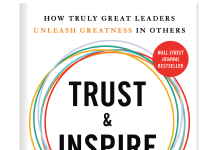I had been working in a management role for many corporations, while also being a professional actor and improviser. At the time, it felt like two very separate worlds. In 2006, I decided to train to become a professional coach and assumed that my work in the corporate world would have given me many of the skills I would learn in my training. What I found instead was that my coaching skills and the skills I had learned as an actor had a lot in common, including listening without judgment, connecting, curiosity, and creativity. With the striking similarities, the idea for this coaching approach was born: What if I introduced acting and improv concepts, skills, and activities into leadership and team development coaching?
Communication Is Key
The International Coach Federation (ICF) defines coaching as partnering with clients in a thought-provoking and creative process that inspires them to maximize their personal and professional potential. This includes setting goals, creating outcomes, and managing personal change. There are many reasons to partner with a coach, but, according to a 2017 ICF study, the No. 1 reason is to optimize individual and team performance. The top result, according to the study, is improved communication skills.
An actor must be an excellent communicator and present characters in a way that creates an emotional connection with the audience by telling a compelling story. During our coaching sessions and workshops, we introduce participants to a variety of experiential activities that focus on communication, both verbal and non-verbal; trust; connection; spontaneity; and creativity. This unique approach is beneficial because while we are usually clear about the what—the need for better communication, more flexibility and creativity—what is not usually clear is how to achieve these things.
The answer is practicing the skills actors use for success to become more flexible, creative, and better communicators. The added benefit is that through experiential learning activities, participant don’t just hear about it, they actually have the experience.
A Few Examples
This approach is effective with coaching both individuals and groups. Here are stories from two of our clients:
Mike is a senior manager in the IT field who sought coaching to enhance his leadership and communication skills. He was comfortable with precision, order, and certainty, but found it difficult to communicate effectively with people who were more creative and less precise. This caused Mike a lot of stress, and in searching for certainty, he developed assumptions and interpretations about his team. He then would behave toward them as if these assumptions and interpretations were the truth. This was confusing to the team and caused a lack of engagement, collaboration, and productivity from his team members. He knew something had to change.
We introduced Mike to some exercises actors use to challenge assumptions and create more comfort with ambiguity. Through these activities, Mike had the aha moment that he was creating scenarios that didn’t exist or serve him or his team. When he realized he was creating such scenarios, he also realized he could stop, have more perspective and clarity, and choose a response rather than reacting.
This type of activity was also helpful in working with a global automotive supplier. It had an international team that needed to work together to ensure just-in-time delivery, and the members were running into barriers—not because of language, but because of assumptions about and interpretations of people’s actions. We did an experiential workshop with them and addressed issues such as status, and what their role was in being a part of a cohesive team (actors call them ensembles). One of the best results was that it gave them a common language to use that creates understanding and helps them work together in a way that is fun and benefits everyone.
These tools, skills, and experiences have proven to be so effective and sustainable that we’ve been asked to start working with internal trainers and coaches to show them how to add applied improv and acting methodology to their tool kits. These trainer sessions are the next step for innovative companies that are looking for a new approach to the same old training. All the world’s a stage—especially in business today.
International Coach Federation (ICF)-accredited Rachel Bellack is the director and lead instructor at Michigan Actors Studio, as well as leadership coach at The Improv Advantage. With more than 20 years of experience developing and facilitating training programs for business, her workshops apply acting methodology to real-world leadership, presentation and business communication. Her approach is to retrain people to practice improv techniques that will ensure personal and professional success and increase confidence. She has worked with organizations such as University of Michigan and BlueCross BlueShield and also currently serves on the Forbes Coaching Council.




